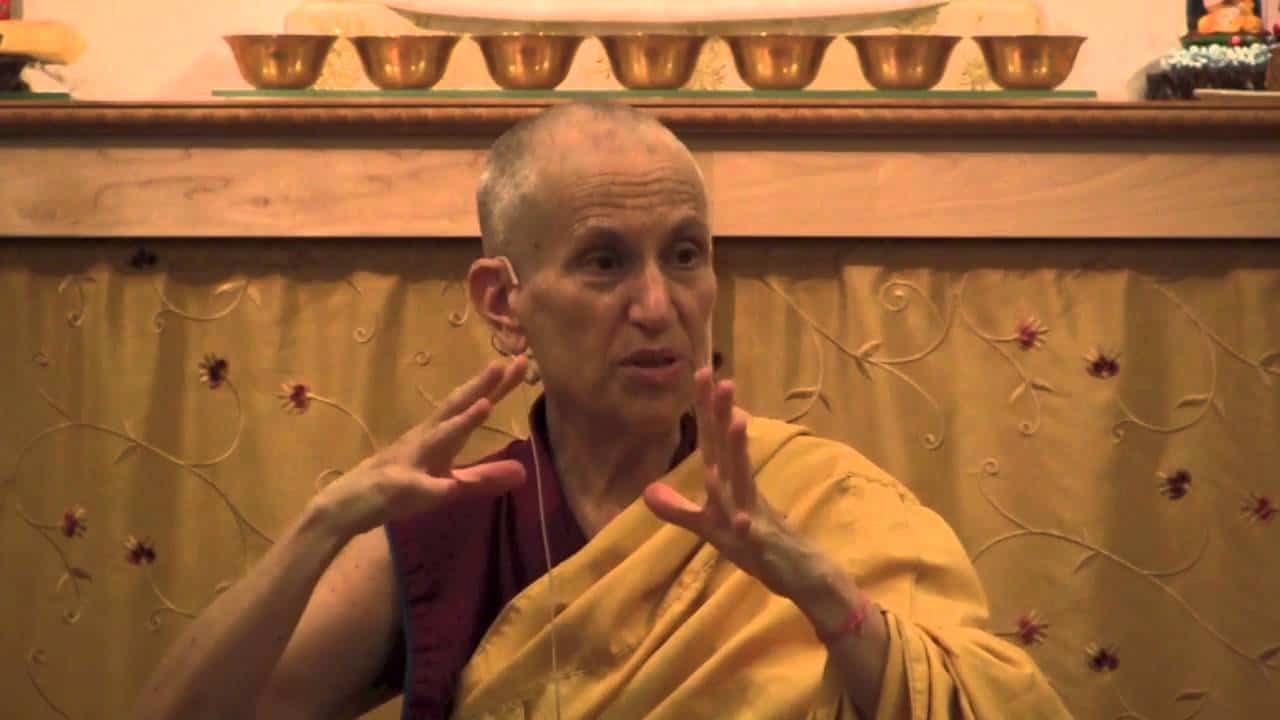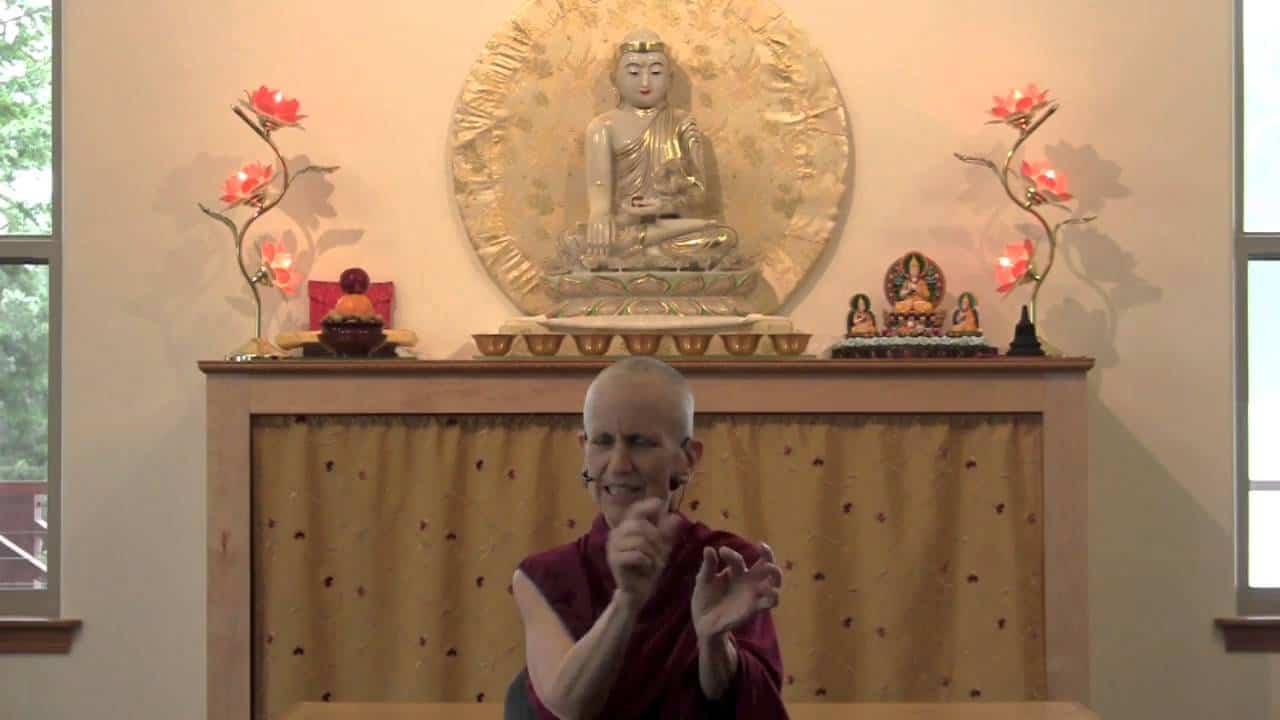The teaching of no-self
Part of a series of teachings on a set of verses from the text Wisdom of the Kadam Masters.
- The meaning of “no self” in context
- How to consider the word “selflessness” in context
- Practical ways to apply the teachings on “no-self”
- When conceptualization is, and is not, beneficial
Wisdom of the Kadam Masters: The teaching of no-self (download)
I thought that we would start these quotations from The Wisdom of the Kadampa Masters. The first one says,
Again, Khuton, Ngok, and Dromtonpa asked Atisha…,
[The first three are Atisha’s disciples]
“Of all the teachings of the path, which is the best?”
Good question, yes?
Atisha replied, “The best learning is realizing the truth of no-self.”
No-self. Let’s just look at that word to start with. The word itself can be very confusing if you hear it, like, “There’s no self.” It sounds like Atisha or the Buddha is saying there’s no person whatsoever, there’s no self. That’s not the meaning at all.
The word “self” can be quite confusing. In Buddhism it can be used in two different ways, depending on the context. Sometimes the word “self” refers to the person that exists, like you and me. Sometimes it refers to what we call the “object of negation,” meaning inherent existence, which is a form of existence that has never existed and never will exist.
The thing is that when you read the phrase, or hear the word in a sentence, it doesn’t necessarily tell you which meaning it has. So if you think of the opposite meaning then you get really confused. When Atisha is saying there’s no self, he doesn’t mean there’s no person. He means there’s no inherent existence, which is that fantasized way of existence that appears to us and that we grasp onto because we think things exist in the way they appear to us, as some kind of objective reality.
The word “self” also comes in “selflessness.” We say, “Well, when we realize that there’s no inherent existence (there’s no self in that way) then we realize selflessness.” Then the word “selflessness” is also confusing in English, because we hear “selfless” and we think about people who are very compassionate. Then we go, “Wait a minute, they’re telling us there’s no inherent existence, and then we realize compassion, and I’m confused.” That’s why some people say “no self” rather than “selfless” or “selflessness,” because it can be confusing in English. I tend to use “selflessness” because “no self” can also be confusing. “Selflessness” means the emptiness of inherent existence, and that can be of either persons or of phenomena.
Now, that’s a bunch of vocabulary words that some of you may be familiar with, some of you may not be. Let me talk a little bit about how to apply it practically.
You’re in retreat now. You’re not talking, you’re looking at your mind. What do you see in your mind? “Yap yap yap yap yap….” There’s a whole lot of discussion going on in your mind, isn’t there? There’s a lot of conceptualization. The mind is thinking and remembering things from the past, planning things from the future, worrying about what’s going to happen now…. All sorts of stuff going on. “Yap yap yap yap yap….” Just constantly. And who does most of this stuff revolve around? Ourselves, of course.
We have to look at conception. Some conceptions are beneficial, some conceptions are not. For example, we’re using our conceptual consciousnesses right now if we’re going to learn and think about the nature of reality, the selfless nature of persons and phenomena. To learn about it, to think about it, to understand the words and meaning, to get a correct intellectual understanding of it, we need concepts. And that correct intellectual understanding, or correct conceptual understanding, is necessary before we can directly perceive emptiness.
So that kind of conceptualization is very useful. When you’re doing lamrim meditation you’re using concepts. That’s very useful. You become much clearer in your mind.
There’s another kind of conceptualization. That’s the “yap yap yap yap yap….” kind, and we all have similar, but also our own habits or patterns of conceptualization. With the “yap yap” kind, some people their main object when their mind is chattering, is “I don’t fit in this group.” There’s always the mind says, “I don’t fit in.”
Then other people have the mind that says, “I’m excluded.” Not that I don’t fit in, “I fit in but they’re excluding me.” They see the world through that lens: “Everybody’s excluding me.” Whereas the other person sees it through: “I don’t fit in anywhere.”
Then there’s a third person who looks around and says, “Nobody likes me.” They’re sure about that, and they can document it. “He didn’t look at me at breakfast time, that means he doesn’t like me.” They see everything through that lens: “They don’t like me.”
Fourth person sees things through: “They’re criticizing me.” Even people ask questions: “That question is a criticism, why didn’t you do that, or that should have been done.”
Then somebody else looks at things through, “They don’t recognize my good qualities.” They see the world through: “I have all these good qualities and nobody recognizes them.”
Then another person sees the world through, “I’m a disaster, I’m no good. Everything I do goes wrong.”
And on and on an on. Are you recognizing maybe one or more of these?
We all have, I would say, all of these to some extent, but we probably focus on one or two that are our primary modes, so that whenever we meet people, or whenever we’re in a situation, that’s our primary thing: “I don’t fit in, they’re excluding me, they’re criticizing me, something’s wrong with me, they don’t appreciate me, ” and then there are a whole bunch of other ones, too, that go on and on. It’s very interesting.
There are a lot of ways to handle these different kinds of conceptualizations. One is to ask, “Are they true?” And to really sit down and examine, “Is this really true?” And look at the facts. “Does somebody not saying ‘good morning’ to me at breakfast mean they don’t like me?” Is that a correct syllogism? Is the pervasion that every time somebody doesn’t look at you at breakfast it means they don’t like you? Is that correct? They can never have a stomach ache and that may be the reason why they don’t look at you at breakfast? They may be half asleep, that could be the reason? “No, it always has to be because they don’t like me.” Is that true or not true?
We need to look at our syllogisms that we’re setting up in our minds, our logic that we’re using to play by these.
Another thing that’s very helpful to do, because all of these conceptualizations just happen to concern me (I wonder why that is, they just all happen to concern me) is to ask ourselves, “Who?”
“They’re criticizing me.”
“Who?” Who is the “I” that they’re criticizing? You sit there in your meditation and you say, “Who is the ‘I’ that they’re criticizing?” Am I my body? Well, they may have criticized my looks, but does that mean I’m my body? If I’m my body, which body am I? The baby body? The toddler body? The teenage body? The adult body? The decrepit, fall-apart body? Which part of the body am I? Which part of the body were they criticizing? You look.
Then, “Well, no, I’m not my body.” Then who is it? Who’s the one they’re criticizing? “They’re criticizing my mind!” Which mind? “Well, they said I was selfish.” Well that’s true. [laughter] And I criticize my selfish mind, too. So why am I so upset? But, am I my selfish mind? If I were my selfish mind then I would be selfish 100% of the time. Well, actually, that selfish mind isn’t there 100% of the time. Maybe 95%. Maybe some days only 50%. But it’s not there all the time. So who, exactly, is it that they’re criticizing?
Are they criticizing the mind that’s asleep? Well, no, I’m not the mind that’s asleep. So you look, who exactly are they criticizing.
“They’re not really criticizing my body. They’re not really criticizing my mind. They’re criticizing ME.”
And then you go back to, “Who?” Who’s that “me” that they’re criticizing? Find it. Who is it? Body, mind. Or something else? Is there something else that’s not the body and mind that’s maybe you? Your body and mind are here, and you’re somewhere else? Like some soul? Exactly who is the recipient of this criticism? And who has the hurt feelings?
“ME!”
Well, who? Who’s the “I” with the hurt feelings? You really look. And this is a very, very good way to get some understanding about “no self.” Because the self, in the way that we ordinarily conceptualize it, is false. We can’t find. Because our ordinary conceptualization of the self is there’s some objective thing that’s “me.” But when we look for that objective thing that’s me we can’t identify one thing that is me forever and ever in all situations.
That gives you some feeling of “self-less-ness” in the sense that there’s no objective, or inherently, existent person that doesn’t fit in, that other people are criticizing, that is always a disaster, that can’t do anything right, that other people are always talking about behind my back….
That’s another one I forgot to mention, “They’re always talking about me behind my back,” and so you see the world that way. And, “They don’t appreciate me”, you see the world that way.
Just check who is that person that you feel so strongly is the object involved in all these conceptualizations.
Venerable Thubten Chodron
Venerable Chodron emphasizes the practical application of Buddha’s teachings in our daily lives and is especially skilled at explaining them in ways easily understood and practiced by Westerners. She is well known for her warm, humorous, and lucid teachings. She was ordained as a Buddhist nun in 1977 by Kyabje Ling Rinpoche in Dharamsala, India, and in 1986 she received bhikshuni (full) ordination in Taiwan. Read her full bio.


